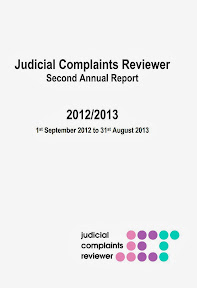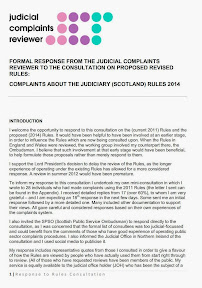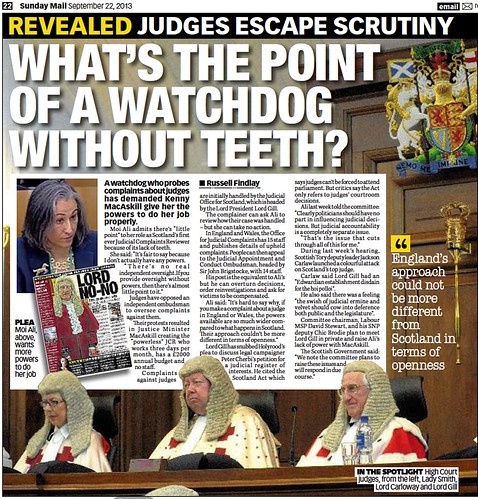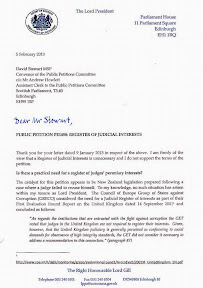Independent’ regulator has made no difference to poor standards in Scotland’s legal profession STRUGGLING to shake off it’s pro-lawyer, anti-client image, the Scottish Legal Complaints Commission (SLCC) published its 2012-2013 annual report last week, revealing the regulator now deals with more complaints per year. The report also reveals the SLCC’s ‘free’ mediation service, which is generating costs & fees of over £45K to mediators, is resulting in a rising numbers of complaints resolutions instead of cases going on to investigation, determination, and potential disciplinary action against rogue lawyers.
The so-called ‘independent’ regulator of lawyers created six years ago by the Scottish Government at a staggering multi-million pound cost to taxpayers which has never been paid back, also published claims it made compensation awards and fee rebates to clients who were victims of crooked law firms to clients of “over £250,000.
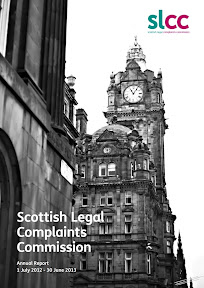 Claims of a feather don’t necessarily match together – SLCC 2012-2013 annual report Figures contained in the SLCC’s own annual report reveal a very different version on the ‘over £250K compensation figure’, showing that law firms are regularly refusing or delaying to pay fines imposed on them by the regulator, forcing the SLCC to resort to costly court action when dodgy law firms & lawyers refuse to pay up to clients now turned into financial victims.
Claims of a feather don’t necessarily match together – SLCC 2012-2013 annual report Figures contained in the SLCC’s own annual report reveal a very different version on the ‘over £250K compensation figure’, showing that law firms are regularly refusing or delaying to pay fines imposed on them by the regulator, forcing the SLCC to resort to costly court action when dodgy law firms & lawyers refuse to pay up to clients now turned into financial victims.
Figures in the annual report actually reveal there were 49 cases where the SLCC was forced to take recovery action against solicitors & law firms who refused to pay up after the SLCC had made compensation awards to clients.The SLCC said it’s action recovered over £72,000 of compensation for complainers in these cases but gave no further details of the cases concerned.
The SLCC said “We continue to see cases of non-compliance where practitioners fail to pay awards which have been made against them by us. We take a firm line on this and use Sheriff Officers and the Small Claims Court processes where necessary to enforce outstanding sums.” The SLCC went onto claim : “We have the full support of the Law Society of Scotland in tackling non-compliance where a solicitor refuses to pay.”
The SLCC continued “In addition, we have found that complainers sometimes have to wait a considerable length of time to receive compensation or fee rebates where a Judicial Factor or Trustee has been appointed. They may also only receive partial compensation.”
“We have raised this point with the Law Society of Scotland. Whilst we understand that other creditors’ interests need to be considered, it is essential that the complaints system incorporates effective redress mechanisms. We are concerned that in an increasing proportion of cases, complainers are at risk of not receiving full redress.”
“In addition to the risk of inadequacy of redress, we are incurring increasing costs in seeking to enforce our decisions. Since we are funded by a levy on the legal profession, these costs are borne by the profession as a whole.”
In two cases, the SLCC was critical of the Law Society’s administration of the investigation and/or its decision-making. The regulator revealed the Law Society paid a total of £500 compensation to the complainers (plus £20 towards their costs).
The SLCC also asked the Society to reconsider one of these complaints which resulted in a complaint being upheld which the Society had previously decided not to uphold. Perhaps unsurprisingly, the SLCC found that in the two other cases, the Law Society had carried out its investigations generally satisfactorily.
While the claimed improvements contained in the annual report may be welcome in some quarters, notably the Scottish Government who are in need of positive figures from it’s inept creation of the SLCC in 2008 by Kenny MacAskill, the SLCC’s statistics and rumours surrounding the identities of law firms continually subject to client complaints actually reveal some unsurprising facts :
(i) Solicitors & law firms who continually abuse clients & consumers in complaint after complaint are using the SLCC’s perceived bias towards the profession and the regulator's lack of powers to avoid complaints investigations,
(ii) Solicitors and their ‘professional representatives & support organisations’ (aka Legal Defence Union, Law Care, Law Society etc) are manipulating paperwork, dates of legal work carried out on behalf of clients, and also the regulator’s mediation service to ensure lawyers who are subject of complaints remain in a job with a clean record, thus avoiding claims for negligence, dishonesty and sanction as a result of prosecution before the Scottish Solicitors Discipline Tribunal .
Keen to promote the image of the SLCC as ‘improved’, even though the evidence appears to show the regulator at a five year stand still, Chief Executive of the SLCC, Matthew Vickers, said “We’ve made some significant improvements in our performance this year but there is no room for complacency. Where lawyers haven’t met the standards which the public should expect, we act to put things right. Where we do make awards we follow up strongly to ensure that redress becomes reality. We believe that our trend analysis and guidance contributes to improving legal services and we look forward to continuing to work with the professional bodies to build public trust and confidence in the Scottish legal profession.”
 Once hailed as a hope to clean up crooked lawyers, the SLCC achieved so little in 5 years. The SLCC also published a five year review of it’s work, which can be viewed online here : The SLCC Five Years On - Facts & Figures. Commenting on the review, Bill Brackenridge, SLCC Chair said : “The review is a good measure of progress and while there is still work to be done it clearly demonstrates the benefits of having an independent regulator. I would encourage the profession to continue to work closely with the SLCC in order to promote best practice, further reduce the number of complaints and continue to improve the reputation of the legal sector with clients, the public and stakeholders”.
Once hailed as a hope to clean up crooked lawyers, the SLCC achieved so little in 5 years. The SLCC also published a five year review of it’s work, which can be viewed online here : The SLCC Five Years On - Facts & Figures. Commenting on the review, Bill Brackenridge, SLCC Chair said : “The review is a good measure of progress and while there is still work to be done it clearly demonstrates the benefits of having an independent regulator. I would encourage the profession to continue to work closely with the SLCC in order to promote best practice, further reduce the number of complaints and continue to improve the reputation of the legal sector with clients, the public and stakeholders”.
In reality, the Scottish Legal Complaints Commission has moved on little since its creation in 2008. Consumers of legal services in Scotland are as unprotected now as they have been for decades under the lawyer investigates their own culture of the Law Society of Scotland.
Indeed, the Law Society of Scotland appears more in charge of regulation of its own member solicitors than ever before, leaving the SLCC as some bystander, far from innocent, and far from having the will to clean up legal services or protect consumers from the costly consistent horrors of dealing with Scotland’s legal profession.
And, as far as independence goes, the ‘independent’ regulator of complaints against Scottish solicitors, is hardly independent at all as Diary of Injustice revealed earlier this year here : A SPECIAL RELATIONSHIP : Investigation reveals Scotland’s ‘independent’ legal regulator is mired in family, business & personal links to legal profession & Law Society
The cost of this five year stand still you ask? Well, poor legal services in Scotland for one, poor client protection for another, hundreds of lawyers escaping regulation & penalties, and a whopping £3 million pounds a year to run the Scottish Legal Complaints Commission on top of the millions every year Scottish solicitors take in ill gotten gains from clients and get away with it.
So, got a complaint against a lawyer ? Well, tell us in the media about it before or during your trip to the Scottish Legal Complaints Commission. Its amazing what some attention, and little transparency can achieve these days…
MEDIATION – Far from free, and a dodge for dodgy lawyers to escape penalty
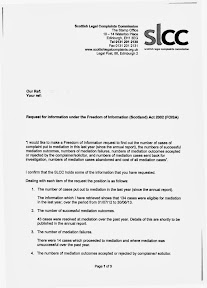 Included in the SLCC’s annual report were claims their “free mediation service is an effective early complaint resolution method with 75% success rate.”
Included in the SLCC’s annual report were claims their “free mediation service is an effective early complaint resolution method with 75% success rate.”
However, a response received from the SLCC in relation to a freedom of information request made by DOI journalists revealed a slightly different story which anyone thinking of going into mediation may wish to consider :
Of the 134 cases eligible for mediation in the last year, 43 cases were settled at mediation, 14 cases were not settled at mediation, 1 case was withdrawn by the complainer, 76 cases were marked as "did not happen", which refers to the fact that the parties did not agree to go to mediation.
The SLCC were asked for statistics on the numbers of mediation outcomes accepted or rejected by complainer or solicitor. However, the SLCC claimed “There is no way of knowing this information. The outcome of the mediation process is agreed between the parties, the mediator does not suggest the settlement. Any settlements reached are confidential.”
Asked about the numbers of mediation cases sent back for investigation, the SLCC disclosed “Any cases that are not settled at mediation will be passed to a Case Investigator to begin the investigation process. In the period in question 90 cases were sent for investigation.”
In spite of claiming its mediation service to be free (to clients), the SLCC disclosed in its FOI response the total cost representing the cost of the mediator and the room hire etc amounts to £45,210.
In the period from 25/04/13 till 30/06/13 the SLCC said it had identified 3 cases which were closed following settlement at mediation. The combined costs of these cases (mediators costs and room hire) amounts to £1335.30
Commenting on the SLCC’s mediation process, a consumer affairs representative who has seen documents from a client who’s case was unsuccessful in mediation, said : “The SLCC’s mediation scheme only seems to guarantee that any lawyer who faces a complaint and who is lucky enough to end up in mediation, can drag out discussions for months, settle for much less than the client appears to have lost, and then go on to find another victim to rip off.”


